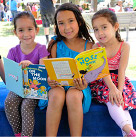With violence so often in the news, many parents struggle with talking to their children about traumatic incidents and signs of malice in the world. Knowing that something has happened, but not having anybody explain things, is a really scary thing to feel for any of us and can be quite traumatic for little ones. The National Child Traumatic Stress Network (NCTSN) defines trauma as “the physical and emotional responses of a child to events that threaten the life or physical or emotional wellness of the child, or of someone critically important to the child such as parent or sibling.”
Traumatic experiences may be one-time events or repeated incidents that effect a child’s internal and/or external environment, which results in toxic stress that can evolve into unhealthy stress levels over time. These experiences are referred to as Adverse Childhood Experiences (ACEs). One in four children experience more than one ACE, and ACEs have been proven to negatively impact brain development, learning and memory, social skills, and mental and physical health.
All of the following are considered ACEs:
- emotional, physical, or sexual abuse
- emotional or physical neglect
- witnessing violence against one’s mother
- a parent’s addiction to alcohol or other substance, or a family member’s mental illness
- separation or divorce
- the incarceration of a parent
- involvement with the foster care system
- witnessing community violence
- living in an unsafe neighborhood
- bullying
- experiencing racism
All children are different. The way children processes information differs and the level of detail you share with a child may vary. But one thing we can agree on, trauma needs to be addressed.
Nobody will know your children better than you do, so it’s important to manage the conversation based on who they are, what they already know, and what it means for them. Here are some tips from the American Psychological Association on how to talk to your children about trauma and difficult situations.
- Think about what you want to say. It’s OK to practice in your head, in the mirror, or with another adult. Some advanced planning may make the discussion easier. You won’t have to think about it off the top of your head.
- Find a quiet moment. Perhaps this is after dinner or while making the next day’s lunch. This is the time and place where your children can be the center of your attention.
- Find out what they know. For example, if there was a shooting at a school or a bomb set off in another country. Ask them “What have you heard about this?” And then listen. Listen. Listen. And listen more.
- Share your feelings with your child. It is OK to acknowledge your feelings with your children. They see you are human. They also get a chance to see that although you are upset, you can still operate and function despite feeling sad. It’s important to model emotions as well as behavior.
- Tell the truth. Lay out the facts at a level they can understand. You do not need to give graphic details.
For young children, you will have to judge whether a conversation about death is warranted. Many parents have remarked, in explaining this complicated ordeal it’s helpful to keep things simple. For instance, the topic can be approached by saying, [deceased individual(s)] no longer feels anything, not hungry, thirsty, scared, or hurting; we will never see them again, but can hold their memories in our hearts and heads.
6. Its ok not to know. Sometimes the answer to the question is, “I don’t know.” “Why did the bad people do this?” “I don’t know” is a suitable answer.
7. Above all, reassure. At the end of the conversation, reassure your children that you will do everything you know how to do to keep them safe and to watch out for them. Reassure them that you will be available to answer any questions or talk about this topic again in the future. Reassure them that they are loved.
Childhood trauma isn’t something you just get over as you grow up. Pediatrician Nadine Burke Harris explains in the following video, that the repeated stress of abuse, neglect and parents struggling with mental health or substance abuse issues has real, tangible effects on the development of the brain. This unfolds across a lifetime, to the point where those who’ve experienced high levels of trauma are at triple the risk for severe health ramifications. Watch as she explains.


